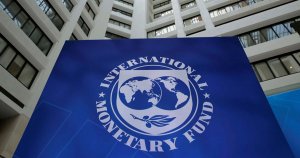
2019-4-24 20:30 |
In a February blog post, economists from the IMF proposed a policy that taxes bank deposits instead of allowing them to accumulate interest. The crypto community reacted accordingly, seeing this as a possible incentive for people to move away from central banks and instead put their money into bitcoin.
IMF Proposes Negative Interest Rates to Fight RecessionsWhile the IMF has recognized the potential cryptocurrencies have, it never really provided explicit support for any digital asset. Loyal to the traditional concept of central banks and fiat currencies, the International Monetary Fund has been tasked with finding a way to fight potential recessions.
The organization’s proposal, which was originally written in February, but started gaining traction during the weekend when the IMF tweeted about it, has caused a stir both among economists and the crypto community. The proposal was written and published by Ruchir Agarwal, an economist at the IMF, and Signe Krogstrup, an advisor in the Research Department at the IMF.
Related: Head of the International Monetary Fund (IMF) Talks About the Benefits of CryptocurrencyThe two discussed implementing a policy which would effectively tax bank deposits instead of allowing them to accumulate interest over time—negative interest rates, much like those seen in Japan. The proposal pointed out that introducing negative interest rates during financial crises was not uncommon among central banks. In theory, it would incentivize people to spend money instead of keeping it in the bank.
Crypto Community ReceptionThis idea was not well received among the crypto community, to say the least, as many have pointed out that incentivizing spending was “postponing the hangover” and not dealing with the real issues behind a recession.
As this theory could only work in a cashless society, the authors proposed establishing a dual monetary system—cash-dollars and e-dollars.
The post explained:
“To illustrate, suppose your bank announced a negative 3 percent interest rate on your bank deposit of 100 dollars today. Suppose also that the central bank announced that cash-dollars would now become a separate currency that would depreciate against e-dollars by 3 percent per year. The conversion rate of cash-dollars into e-dollars would hence change from 1 to 0.97 over the year. After a year, there would be 97 e-dollars left in your bank account.”
Government bond yields are down from around 10 percent in the 1980s to almost 2.5 percent in 2019. If they continue to follow the trajectory, it’s possible the US will see near-zero interest rates. This would correlate to zero or negative interest rates on saving deposits and other safe, liquid investments.
Source: Investing Bitcoin Could Be the Best Alternative to Forced SpendingAgarwal and Krogstrup then argued that if a person decided to withdraw the 100 dollar deposit instead, it would still be worth 97 dollars after a year. Therefore, people would be incentivized to spend both their cash-dollars and e-dollars.
By effectively forcing people to spend their money, central banks would ensure a short-term influx of money into the market. However, many economists and financial analysts agree that this would be detrimental to the economy. The crypto community has also expressed concerns about the loss of financial freedom and has suggested an alternative—Bitcoin.
No one in the mainstream ever says "These econ clowns have failed, they're dangerous, get them the hell out out of the market-manipulation business". It's always moar moar moar. https://t.co/NzuhH0uYp2 pic.twitter.com/ctw2oWsq8Z
— Rudy Havenstein, Monetary Policy Pioneer (@RudyHavenstein) February 18, 2018
While others have suggested more traditional alternative assets such as real estate, gold, and art, none of them offer the same benefits that cryptocurrencies have. Cryptocurrencies act both as a cash substitute and a store of value, which means people could choose to spend or save their funds. One major advantage offered by cryptocurrencies over other asset classes is mobility. Transferring cryptocurrencies across the world, in any amount, takes a few minutes and does not require any third-parties, at relatively low fees.
Furthermore, unlike cash, Bitcoin is considered deflationary. The total number of bitcoins that can be in circulation is capped at 21 million BTC, and approximately every four years the number of bitcoins that can be mined is halved until the cap is reached.
Bitcoin as an asset could prevent government(s) from compelling people to comply with monetary policies that do not serve the common person’s interests. If banks start imposing negative interest on deposits then citizens will effectively lose a percentage of their savings every year. Holding bitcoin and other cryptocurrencies in such scenario could prevent people from being the victims of negative interest rates.
Theft on world scale
— Bitcoin Gear (@Bitcoin_Gear) April 21, 2019
Activities such as these give people more incentive to adopt cryptocurrencies and “be their own bank”—the very idea behind the birth of Bitcoin.
Related: Bitcoin is one of the best-performing assets of 2019Many have thus turned to Bitcoin, seeing it as the only way to salvage their savings if negative interest rates see implementation. There are, of course, faster and more easily scalable cryptocurrencies than Bitcoin, but its market cap and rate of adoption make it the best choice, according to BTC enthusiasts.
The world’s largest and most popular coin could be a tool used for financial freedom and mobility, even in first-world economies, if negative interest rates ever see implementation from central banks.
The post Bitcoin could counter the IMF’s proposed negative interest rates appeared first on CryptoSlate.
origin »Bitcoin price in Telegram @btc_price_every_hour
Bitcoin (BTC) íà Currencies.ru
|
|




